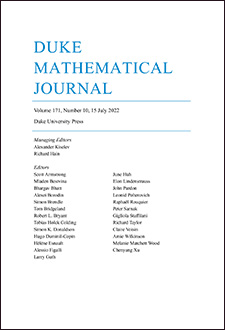Abstract
We consider the Schrödinger equation with a logarithmic nonlinearity in a dispersive regime. We show that the presence of the nonlinearity affects the large time behavior of the solution: the dispersion is faster than usual by a logarithmic factor in time, and the positive Sobolev norms of the solution grow logarithmically in time. Moreover, after rescaling in space by the dispersion rate, the modulus of the solution converges to a universal Gaussian profile. These properties are suggested by explicit computations in the case of Gaussian initial data and remain when an extra power-like nonlinearity is present in the equation. One of the key steps of the proof consists in working in hydrodynamical variables to reduce the equation to a variant of the isothermal compressible Euler equation, whose large time behavior turns out to be governed by a parabolic equation involving a Fokker–Planck operator.
Citation
Rémi Carles. Isabelle Gallagher. "Universal dynamics for the defocusing logarithmic Schrödinger equation." Duke Math. J. 167 (9) 1761 - 1801, 15 June 2018. https://doi.org/10.1215/00127094-2018-0006
Information





